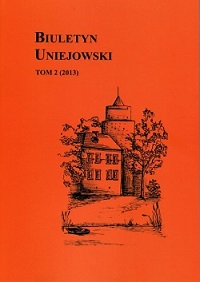Cechy regionalne w budownictwie na terenie gminu Uniejów
DOI:
https://doi.org/10.18778/2299-8403.02.04Słowa kluczowe:
tradycyjna zabudowa wiejska, konstrukcje murowane z kamienia, gmina Uniejów, Kotlina Kolska, PolskaAbstrakt
Since 2011 the authors have been researching the regional features of rural construction in the region of Kolska Structural Basin and in its vicinity. The specific nature of this region involves a high share of buildings erected from the local building stone – upper-Cretaceous limestone silica building stone. The material, common in the area about 1000 km2 in size, is used for outcropping in the region of the village of Rożniatów, the Uniejów commune, where such formations appear on the surface in the upper layer. The article presents the results of research referring to the Uniejów commune, in which there has been listed about 30% of the total of more than 2000 buildings made from limestone silica building stone. Such a considerable distribution of that material not typical of lowland facilitated the study of the technology applied in the regional rural construction, as well as the architectonic solutions used. The buildings made from limestone silica building stone represented by housing and livestock structures, barns, churches and special structures, due to their unique character, provide a very characteristic element of the local landscape. Unfortunately, from year to year the number of structures demonstrating the regional specific nature in the commune has been decreasing. The deteriorating technical condition of the buildings results in launching maintenance works where the stone is replaced with today’s building materials. More and more structures get demolished. It is necessary to initiate the protection of that unique heritage of material culture. In such actions a special role should be played by local government.
Bibliografia
Gorączko A., Gorączko M., Wpływ stosowania miejscowego kamienia budowlanego na wyraz architektoniczny zabudowy wiejskiej, [w:] lntegracja sztuki i techniki w architekturze i urbanistyce, UTP, Bydgoszcz [w druku].
Google Scholar
Gorączko M., Gorączko A., Budownictwo regionalne w widłach Warty i Neru, ,,Acta Scientiarum Polonorum" 2011, Architectura, 10 (2), s. 15-24.
Google Scholar
Kobojek E., Położenie fizycznogeograficzne miasta i gminy Uniejów, ,,Biuletyn Uniejowski" 2012, 1, s. 9–22.
Google Scholar
DOI: https://doi.org/10.18778/2299-8403.01.01
Nowacki K., Objaśnienia do Szczegółowej Mapy Geologicznej Polski 1: 5O OOO, Arkusz Dąbie (551), PIG, Warszawa 1995.
Google Scholar
Nowacki K., Szczegółowa Mapa Geologiczna Polski 1: 5O OOO, Arkusz Dąbie (551), PIG, Warszawa 1993.
Google Scholar
Osiecka E., Materiały budowlane. Kamień - ceramika - szkło, Politechnika Warszawska, Warszawa 2003.
Google Scholar
Petera-Zganiacz J., Forysiak J., Historia rozwoju doliny Warty w basenie uniejowskim, ,,Biuletyn Uniejowski" 2012, 1, s. 23-41.
Google Scholar
DOI: https://doi.org/10.18778/2299-8403.01.02
Różalski J., Właściwości budowlane kamienia, ,,Budownictwo Wiejskie" 1958, 12, s. 21-26. Różalski J., Wytyczne stosowania kamienia w budynkach mieszkalnych niskokondygnacyjnych i gospodarczych, Wyd. ITB, Warszawa 1958.
Google Scholar
Trembecki A., Wstępne ujęcie właściwości technologicznych wapieni lekkich płyty lubelskiej i niecki łódzkiej jako materiału dla budownictwa domków jednorodzinnych, ,,Budownictwo Wiejskie" 1957, 1, s. 22-27.
Google Scholar
Pobrania
Opublikowane
Jak cytować
Numer
Dział
Licencja

Utwór dostępny jest na licencji Creative Commons Uznanie autorstwa – Użycie niekomercyjne – Bez utworów zależnych 4.0 Międzynarodowe.








